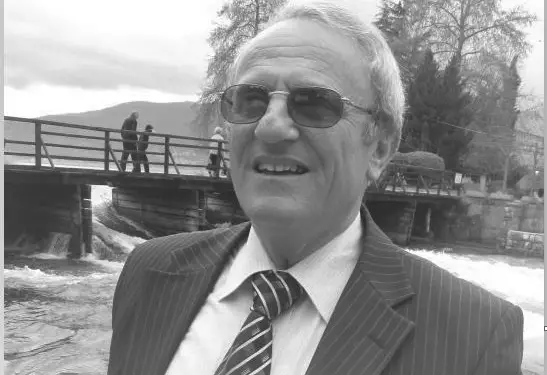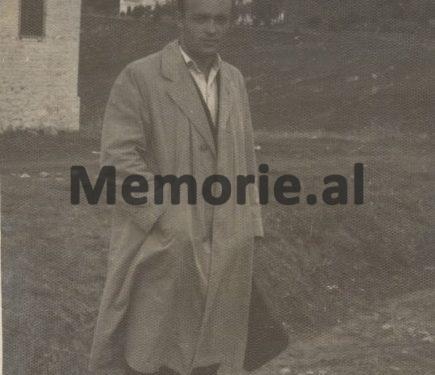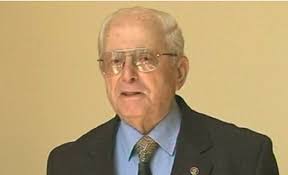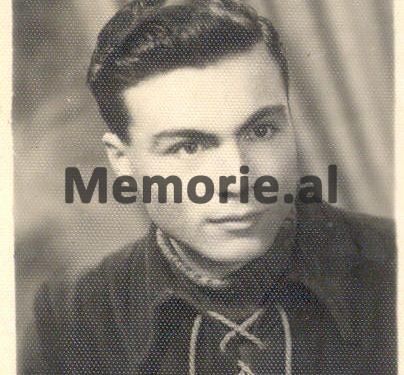From Shpendi Topollaj
-URAN KALAKULLA, A LIFE OF SUFFERING AND HUMAN DIGNITY-
Memorie.al / Uran Kalakulla, died almost unexpectedly on a spring day. He had suffered a lot in his life, but he was never broken. After the overthrow of the dictatorship, with his writings and published books, he became a well-known figure. Personally, I am happy that I had this fighter for freedom and human rights as a friend. For his exceptional qualities, character, culture, clarity of ideas, love for country; so for this pure democrat, if I had been given the opportunity, at his funeral, I would remember the unforgettable words that Hugo said about Voltaire’s death: “… Since night comes from thrones, let light come from graves” !
And I am fully convinced that in saying so, I would not be wrong at all. Even among the ancient Greeks, Uranus personified the God of the Sky, from where the earth received its light. But in life, as it often happened in mythology, those who aimed to spread light to others were themselves punished with darkness.
I read his book “21 years of communist prison”, which he sent me, remembering that he once told me that; “Many crimes were committed in our country. But what happened was also a great test of those who suffered. The prison showed the character of each. There were those who entered with dignity and left it even more dignified. Blessed is he who managed to save his soul.”
Uran Kalakulla, as it appears throughout the book, remained so intact in his honor that he unabashedly praises others, whether condemned or their guardians.
He writes: “When a man is in front of danger, and he with little courage, if he has some dignity in himself, he grits his teeth and tries to face the danger, trying to face it, or at least endure it or as best as possible. That classic or romantic chivalry of the knights of antiquity or the Middle Ages seems to me to have long since passed away, if it was ever true.
I have had this for a long time and I continue to have the opinion that true bravery is not at all in the sword and the strong muscles of the body, but in the heart and soul. During the time of the prison, I saw not men, but men, who had physical symptoms and were bleeding in front of a dwarf captor!
Just as I have seen boys, who physically were not only average and sometimes weak, so much so that a strong wind could take them away, but when it came to the danger of suffering, they gritted their teeth and stood like real men” .
Concluded that the book of Uranus; “21 years in a communist prison”, I read it after the sensational book by F. M. Dostoevsky “Notes from the House of the Dead”. Any reader who has some literary training will see that I am very right when I say that the suffering in the prisons of the communist period in Albania is much worse than that of the prisons of the time of the Tsar in Russia, and that our Uran Kalakulla, does not fall at all lower in their artistic descriptions, than the Russian genius himself.
He is an extraordinary master of the pen. His analyzes and descriptions are irreproachable, so much so that the question arises: Why was it necessary to do such a great damage to our culture, locking such powerful talents in cold cells?!
Seeing that “Albania of the 60s was all a despair, Urani, who called communism a historical fatality, together with other comrades such as: Pjetër Arbnori, Agim Musta, Tanush Kaso, etc., in complete illegality and with incredible courage, considering the time, they formed an opposition group, whose leader was elected Urani.
This group had a program, which aimed at that ideology that would lead them to a position between the extreme left and the extreme right. They had entered a job even though they repeated from time to time a saying of Chernishevsky, that in popular regimes, politics is not a walk or pleasant conversations on “Nevsky” boulevard, but it is in prison, torture, bullets and rope! And so it turned out to be true. On May 27, 1961, they were, under still unclear circumstances, arrested.
The sentence was known: He and Pjetër Arbnori by death, the others with long terms of imprisonment. Talking about the prisons of the Albanian prisons during the dictatorship does not say anything new. There are dozens and hundreds of witnesses who have shown and described their true and inhuman face. Uranus has taken on something more. He breaks down human characters as “The ugliness of the human world stands out, better than anywhere else in the prison.
And, consequently, no one is a hero when he falls into prison, but he can become there, or he can go to the other end, that is, from a man, to a caterpillar, to a crawling worm, all alone, so that he can save his human existence. Thus, as a result, the prison has two faculties, that of honor and manhood and that of shame and infamy”.
Spending a full 21 years among policemen, captains and rats, is no joke. Just as the “German” handcuffed attitude is no joke. But more than physical pain, Uranus describes the psychological state.
In this misfortune that has found him, at a very young age, he surprisingly realizes that he does not feel fear at all. Inside himself he feels stoic. He feels proud that the idea of waiting for the inevitable with calmness, coolness, courage and dignity accompanies him even inside the death chamber.
“Despair, sobbing, tears, cries and calls as if from a woman, have seemed to me (in such cases), not only signs of an absolute inability of myself to restrain myself, but of such a weakness that has rooted both in an infinite love for oneself (and, as a consequence, an extreme compassion), as well as in an absolute lack of seriousness and self-respect”.
He himself awaits death as in the legends. Because he knows that they will not come to take him and execute him during the day, he does what he does in between the exhaustions, he rests a little. But at night he stands, with his face turned to the door, so that when they opened it, they would find him in front of him, ready or not to drag him away.
He was waiting for death just like Mersoi of Camus, who only wished that on the day of his execution, there would be as many people as possible, except that he was being punished accused of murder, but in reality, he had not committed any crime, except that you didn’t cry at your mother’s funeral.
“Then,” he writes, “I decided to throw out some slogans for all the convicts to hear.” As much as my mouth would eat, just like in front of the firing squad”. In everyday life, it is much easier for a person to maintain his dignity. There are many things that he can do or avoid.
But in prison, the work is different. You are monitored at every step, isolated from the world, forced to follow the orders of others, often even ignorant ones, you can’t put up with provocations and harassment. Without your will, you can become a prey to endless quarrels and fights.
They insult and humiliate you, put you in a dungeon for nothing for a month. But even when you counted the hours you had left to spend in that hell, they could re-sentence you without harm, with five, six, seven, eight, nine and ten years in prison others.
They could even kill you altogether and leave you without a grave, so that neither the mole nor the mole would be found. And in these conditions, the desolate man is in trouble. Lower your back? To be served? To provoke and spy on others?
So, to lose something very valuable from yourself: honor, which then you have nowhere to find? Now choose and get it. And Uran knew how to choose, so he didn’t spare anyone, like those who lowered their backs, did harm to their friends, like the executioners who were called prosecutors, investigators, judges, prison commanders, operatives and even guards.
There is no need to save them all. I mention them by name and surname, otherwise the responsibility of the crime would be spread or he himself would remain anonymous. In these cases, the pen of Uranus is bitter.
And how pleasant this pen becomes, when it talks about a super intellectual, who pays tribute to the Albanian genius, like Mustafa Bajraktari, who was beaten like many others, in prison. For someone who has never been in prison, it is hard to believe that there is infinity of types and events, not to say an entire universe!
It is this universe that Uranus Kalakulla gives us. Each chapter would be more than enough to write the script of an impressive movie. The book; “21 Years of Communist Prison” constitutes perhaps better than any other book of its kind the prison encyclopedia.
Brave and cowardly, executioners and victims, loyal and unfaithful, good and bad pass before the eyes of the readers. We see there the group of prison elders, fallen from the fig tree, men of God, writers and Marxist “doctrinaires”, foreigners who believed in the Albanian “paradise”, but also the villains of the prison.
Dealing with these, as well as with the “black generals” and “red prosecutors”, who today should be ashamed of what they have done, Uran Kalakulla, does a great service to our history.
He shows that; how the truth should be written and gives a final blow to all those who say: “we are tired of prison literature”. Uranus seems to say to them: “You never got tired of blackening our lives, and you only get upset because we write about what we have seen and removed on our backs”? They should know the saying of Titus Livius, that: “Truth may be obscured for a while, but never extinguished.” Memorie.al















